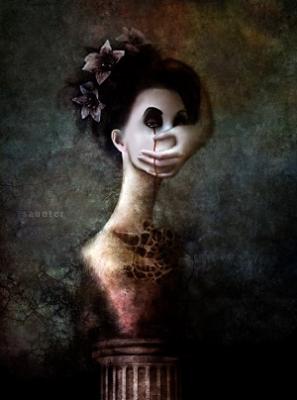02:53 Sep 22 2013
Times Read: 628
Dealing with a person who has a strong Histrionic personality is, at best, entertaining (strong sarcasm here) and I use the term "friend" loosely. Don't get me wrong she can be very nice, especially when she firsts meets you. But once you get to know her, you can see how she manipulates and turns things around to be the victim yet not the victim. Its is quite funny if you ask me. I have gone to her about the things that red flag her as Histrionic Personality Disorder, and explained to her that it s a huge possibility of why she doesn't have too many real friends. I put this topic in Illusions/Delusions because this particular person says "I am too dam cute to be this broke!" and coming from a woman well into her 40s that has not taken good care of herself and leaches off others...she is clearly delusional. Please note that I can say all this because I have voiced my opinion to her already. I feel for her...I have tried to be a friend but she is way too emotionally draining and brings way too much drama into my life. The best I can do for her is to listen (from a distance, preferably via phone or text). If she is not willing to seek help...what can I do? I fear she will end up all alone with no one...all because of her need for attention and how she goes about it and how she uses her body to get people (mostly men) to do things for her. I mean come on 40 + ys old and never had a job longer than 6 months? She will not be able to survive on her own (unless she finds a full time sugar daddy).
Histrionic personality disorder is characterized by a long-standing pattern of attention seeking behavior and extreme emotionality. Someone with histrionic personality disorder wants to be the center of attention in any group of people, and feel uncomfortable when they are not. While often lively, interesting and sometimes dramatic, they have difficulty when people aren’t focused exclusively on them. People with this disorder may be perceived as being shallow, and may engage in sexually seductive or provocating behavior to draw attention to themselves.
Individuals with Histrionic Personality Disorder may have difficulty achieving emotional intimacy in romantic or sexual relationships. Without being aware of it, they often act out a role (e.g., “victim” or “princess”) in their relationships to others. They may seek to control their partner through emotional manipulation or seductiveness on one level, whereas displaying a marked dependency on them at another level.
Individuals with this disorder often have impaired relationships with same-sex friends because their sexually provocative interpersonal style may seem a threat to their friends’ relationships. These individuals may also alienate friends with demands for constant attention. They often become depressed and upset when they are not the center of attention.
People with histrionic personality disorder may crave novelty, stimulation, and excitement and have a tendency to become bored with their usual routine. These individuals are often intolerant of, or frustrated by, situations that involve delayed gratification, and their actions are often directed at obtaining immediate satisfaction. Although they often initiate a job or project with great enthusiasm, their interest may lag quickly.
Longer-term relationships may be neglected to make way for the excitement of new relationships.
Symptoms of Histrionic Personality Disorder
A pervasive pattern of excessive emotionality and attention seeking, beginning by early adulthood and present in a variety of contexts, as indicated by five (or more) of the following:
Is uncomfortable in situations in which he or she is not the center of attention
Interaction with others is often characterized by inappropriate sexually seductive or provocative behavior
Displays rapidly shifting and shallow expression of emotions
Consistently uses physical appearance to draw attentionto themself
Has a style of speech that is excessively impressionistic and lacking in detail
Shows self-dramatization, theatricality, and exaggerated expression of emotion
Is highly suggestible, i.e., easily influenced by others or circumstances
Considers relationships to be more intimate than they actually are
As with all personality disorders, the person must be at least 18 years old before they can be diagnosed with it.
Histrionic personality disorder is more prevalent in females than males. It occurs about 2 to 3 percent in the general population.
Like most personality disorders, histrionic personality disorder typically will decrease in intensity with age, with many people experiencing few of the most extreme symptoms by the time they are in the 40s or 50s.
How is Histrionic Personality Disorder Diagnosed?
Personality disorders such as histrionic personality disorder are typically diagnosed by a trained mental health professional, such as a psychologist or psychiatrist. Family physicians and general practitioners are generally not trained or well-equipped to make this type of psychological diagnosis. So while you can initially consult a family physician about this problem, they should refer you to a mental health professional for diagnosis and treatment. There are no laboratory, blood or genetic tests that are used to diagnose histrionic personality disorder.
Many people with histrionic personality disorder don’t seek out treatment. People with personality disorders, in general, do not often seek out treatment until the disorder starts to significantly interfere or otherwise impact a person’s life. This most often happens when a person’s coping resources are stretched too thin to deal with stress or other life events.
A diagnosis for histrionic personality disorder is made by a mental health professional comparing your symptoms and life history with those listed here. They will make a determination whether your symptoms meet the criteria necessary for a personality disorder diagnosis.
Researchers today don’t know what causes histrionic personality disorder. There are many theories, however, about the possible causes of histrionic personality disorder. Most professionals subscribe to a biopsychosocial model of causation — that is, the causes of are likely due to biological and genetic factors, social factors (such as how a person interacts in their early development with their family and friends and other children), and psychological factors (the individual’s personality and temperament, shaped by their environment and learned coping skills to deal with stress). This suggests that no single factor is responsible — rather, it is the complex and likely intertwined nature of all three factors that are important. If a person has this personality disorder, research suggests that there is a slightly increased risk for this disorder to be “passed down” to their children.
Treatment of histrionic personality disorder typically involves long-term psychotherapy with a therapist that has experience in treating this kind of personality disorder. Medications may also be prescribed to help with specific troubling and debilitating symptoms.






COMMENTS
-